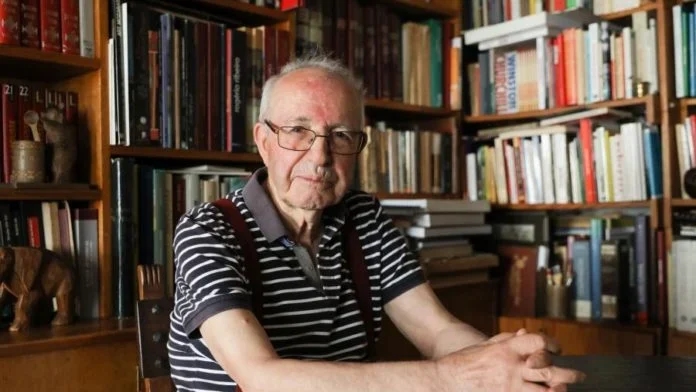Historian António Borges Coelho has passed away

Historian António Borges Coelho, professor, writer, researcher, and anti-fascist fighter, died today at the age of 97, the editorial team Caminho told Lusa news agency.
According to the same source, Borges Coelho died in a support health unit, on the outskirts of Lisbon, where he was being treated, following a respiratory infection.
Born in Murça, in Trás-os-Montes, on October 7, 1928, Borges Coelho received the University of Lisbon Prize in 2018, an institution where he was a student and professor.
The jury, chaired by then-rector António Cruz Serra, justified the distinction by his "unique career in Portuguese historiography" and "innovative work".
In addition to highlighting the "relevance of his scientific career" and the fact that he was persecuted "often in adverse circumstances" during the dictatorship, the jury emphasized the great erudition and accessibility of Borges Coelho's work, and "his commitment to culture and language."
The Caminho publishing house, which mourns the historian's death, recalls in a statement the career of the retired professor at the Faculty of Arts of Lisbon, and his dedication to research in the field of History since 1957.
"His life path was characterized by intense political and academic activity, and he was considered one of the most prestigious Portuguese historians," the editorial recalls.
In 1999, Borges Coelho was awarded the Order of Sant'Iago da Espada and, in 2018, he was awarded the Grand Cross of the Order of Liberty.
His bibliography includes poetry, fiction, essays and theater and "a vast and rich bibliography materialized in dozens of works", such as "The Roots of Portuguese Expansion", "The Revolution of 1383", "Portugal in Arab Spain", "The Inquisition of Évora" and seven volumes of the History of Portugal.
This year he published the collection "Poemas" in Caminho.
"History is a dangerous science," said the historian in an interview with the Lusa news agency in October 2018.
"I am a full professor, because I am, but I am a normal citizen and I like to feel like a citizen like everyone else," he declared, expressing his joy at the tributes he received, organized by "friends and sincere people."
"It makes me happy when people think I've done something useful," he said.
Historian António Borges Coelho, professor, writer, researcher, and anti-fascist fighter, died today at the age of 97, the editorial team Caminho told Lusa news agency.
According to the same source, Borges Coelho died in a support health unit, on the outskirts of Lisbon, where he was being treated, following a respiratory infection.
Born in Murça, in Trás-os-Montes, on October 7, 1928, Borges Coelho received the University of Lisbon Prize in 2018, an institution where he was a student and professor.
The jury, chaired by then-rector António Cruz Serra, justified the distinction by his "unique career in Portuguese historiography" and "innovative work".
In addition to highlighting the "relevance of his scientific career" and the fact that he was persecuted "often in adverse circumstances" during the dictatorship, the jury emphasized the great erudition and accessibility of Borges Coelho's work, and "his commitment to culture and language."
The Caminho publishing house, which mourns the historian's death, recalls in a statement the career of the retired professor at the Faculty of Arts of Lisbon, and his dedication to research in the field of History since 1957.
"His life path was characterized by intense political and academic activity, and he was considered one of the most prestigious Portuguese historians," the editorial recalls.
In 1999, Borges Coelho was awarded the Order of Sant'Iago da Espada and, in 2018, he was awarded the Grand Cross of the Order of Liberty.
His bibliography includes poetry, fiction, essays and theater and "a vast and rich bibliography materialized in dozens of works", such as "The Roots of Portuguese Expansion", "The Revolution of 1383", "Portugal in Arab Spain", "The Inquisition of Évora" and seven volumes of the History of Portugal.
This year he published the collection "Poemas" in Caminho.
"History is a dangerous science," said the historian in an interview with the Lusa news agency in October 2018.
"I am a full professor, because I am, but I am a normal citizen and I like to feel like a citizen like everyone else," he declared, expressing his joy at the tributes he received, organized by "friends and sincere people."
"It makes me happy when people think I've done something useful," he said.
Historian António Borges Coelho, professor, writer, researcher, and anti-fascist fighter, died today at the age of 97, the editorial team Caminho told Lusa news agency.
According to the same source, Borges Coelho died in a support health unit, on the outskirts of Lisbon, where he was being treated, following a respiratory infection.
Born in Murça, in Trás-os-Montes, on October 7, 1928, Borges Coelho received the University of Lisbon Prize in 2018, an institution where he was a student and professor.
The jury, chaired by then-rector António Cruz Serra, justified the distinction by his "unique career in Portuguese historiography" and "innovative work".
In addition to highlighting the "relevance of his scientific career" and the fact that he was persecuted "often in adverse circumstances" during the dictatorship, the jury emphasized the great erudition and accessibility of Borges Coelho's work, and "his commitment to culture and language."
The Caminho publishing house, which mourns the historian's death, recalls in a statement the career of the retired professor at the Faculty of Arts of Lisbon, and his dedication to research in the field of History since 1957.
"His life path was characterized by intense political and academic activity, and he was considered one of the most prestigious Portuguese historians," the editorial recalls.
In 1999, Borges Coelho was awarded the Order of Sant'Iago da Espada and, in 2018, he was awarded the Grand Cross of the Order of Liberty.
His bibliography includes poetry, fiction, essays and theater and "a vast and rich bibliography materialized in dozens of works", such as "The Roots of Portuguese Expansion", "The Revolution of 1383", "Portugal in Arab Spain", "The Inquisition of Évora" and seven volumes of the History of Portugal.
This year he published the collection "Poemas" in Caminho.
"History is a dangerous science," said the historian in an interview with the Lusa news agency in October 2018.
"I am a full professor, because I am, but I am a normal citizen and I like to feel like a citizen like everyone else," he declared, expressing his joy at the tributes he received, organized by "friends and sincere people."
"It makes me happy when people think I've done something useful," he said.
Diario de Aveiro



